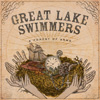GREAT LAKE SWIMMERS : A FOREST OF ARMS
- Zero in the City
- Shaking All Over
- Don't Leave Me Hanging
- One More Charge at the Red Cape
- I Was a Wayward Pastel Bay
- A Bird Flew Inside the House
- A Jukebox in a Desert of Snow
- I Must Have Someone Else's Blues
- The Great Bear
- With Every Departure
- Expecting You
Label : Nettwork
Time : 40:46
Release Date : April 21, 2015
Review (AllMusic) : Toronto's Great Lake Swimmers have been quietly honing their signature wet and lonesome, echo-laden brand of mellow folk-pop since 2005, while like-minded bands such as Fleet Foxes, Band of Horses and Shearwater get all of the press. On their fourth album, Tony Dekker and his revolving cast of co-conspirators walk a little taller than on previous releases, employing a larger, more band-oriented sound that lovingly elevates (and amplifies) Dekker's simple, refined melodies into something both peaceful and majestic. Recorded in castles, churches, and community centers in and around the Saint Lawrence River's Thousand Islands, which straddle the U.S.-Canada border, Lost Channels is filled with sepia-tone postcard images of dusty boots following the treads on seasonal roads, and pastoral woodcuts of stoic, blue-collar heartache and wide-eyed innocence. From the old-school country-folk of "The Chorus in the Underground" and "Unison Falling into Harmony" to the straight-up indie folk-rock of "Pulling on a Line" and "Palmistry" - the latter, as beautiful as it is owes more than just an instrumentation nod to R.E.M.'s "Losing My Religion" - Great Lake Swimmers have proven once again that Canada, as rich as it is in arty indie rock like Destroyer, Plants and Animals, and Wolf Parade, is also the country that gave the world Neil Young, Gordon Lightfoot, and Joni Mitchell.
Review (Pitchfork) : It's been more than 10 years since Great Lake Swimmers released their self-titled debut. Recorded in an empty Ontario grain silo, it was mostly Tony Dekker's acoustic guitar and honeyed voice singing about silent films and the natural world. The album seemed at first like an ideal sedative-its hushed reverberating folk songs are enhanced with the sound of actual crickets chirping. But the songs were too engaging and eventful to be lullabies. On A Forest of Arms, their sixth album, Great Lake Swimmers continue to experiment with recording locations, this time tracking some of the vocals and guitar in Ontario's Tyendinaga Cavern and Caves. But while Dekker is still trying to push his band into new territory with bigger arrangements and peppier tempos, he runs into problems. First among the latter is Dekker's voice. His gentle cooing is perfect for quiet, contemplative ballads but becomes listless in songs like the the New Pornographers-style rave-up "I Must Have Someone Else's Blues" and the bouncy "A Bird Flew Inside the House". Still, he remains economical and fairly straightforward with his words, and it suits him. Lead-off track "Something Like a Storm", for example, sweetly describes a father embracing the calm before the storm of childbirth. But the album's sequence trips him up-for some reason the band includes an alternative version, reprising nearly the same lyrics in closing track "Expecting You". Once was nice, twice is overkill. It's probably no coincidence this album's best tracks are the ones where Dekker is singing in a cave with only subtle accompaniment. "Don't Leave Me Hanging" is gorgeous-simple and direct. "You had different hair when I saw you last," Dekker sings, delicately fingerpicking amid the violins, before pleading for his lover (and/or a bird) not to leave him hanging and "drowning in shallow water." The natural world consistently elicits a contagious sense of awe from Dekker. The album takes its title from a line in "The Great Bear", another song in this vein. "You won't believe what's out there," he sings, and and he's convincing. These moments are as absorbing as those old grain-silo songs, with the same sort of hypnotic pull, as you picture the winding streams and forests Dekker traces. But too often, he strays from the hushed mode he's mastered and ends up supplanting the band's strengths with its weaknesses.
